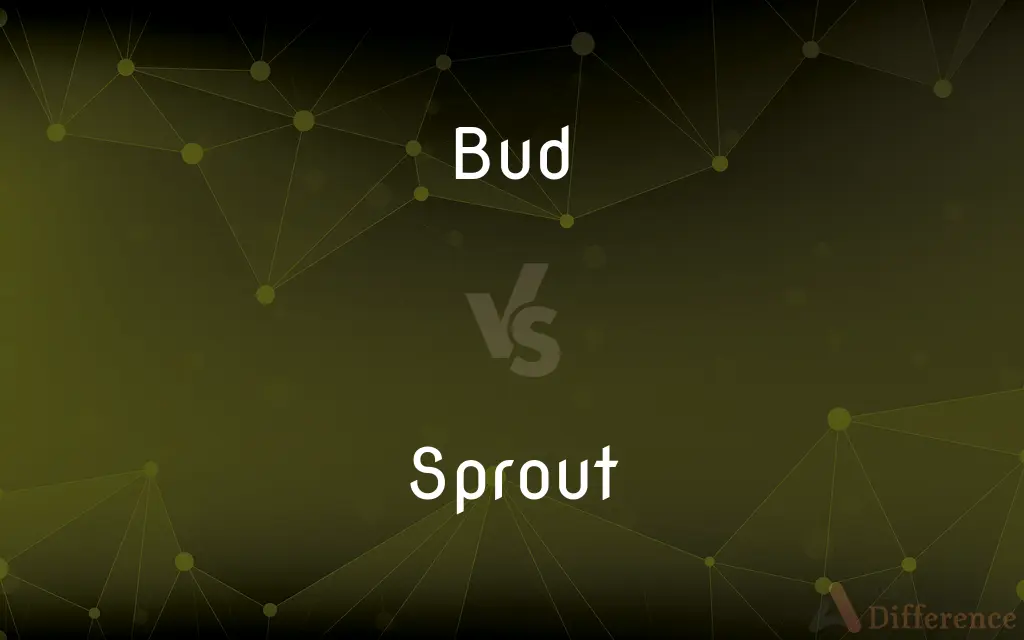Bud vs. Sprout — What's the Difference?
By Tayyaba Rehman & Urooj Arif — Updated on March 22, 2024
A bud is a compacted undeveloped shoot, harboring potential for new growth, while a sprout is the initial growth visible when a seed starts to grow, showcasing the beginning of life.

Difference Between Bud and Sprout
Table of Contents
ADVERTISEMENT
Key Differences
Buds are embryonic shoots found on plants, comprising undeveloped or embryonic leaves, stems, or flowers, encased often in protective scales. They are the promise of future growth, situated at the tip of a stem or in the axil of a leaf. On the other hand, sprouts emerge from a germinating seed, representing the first stages of growth where roots, stems, and leaves begin to develop from the seed. This marks the plant's initial venture into its growing environment.
While buds are primarily associated with perennial and annual plants, acting as a mechanism for vegetative reproduction and flowering, sprouts are associated with the germination phase of a seed's life cycle, crucial for the continuation of a species. Sprouts are seen across a variety of plant species, including both those that produce buds in later stages and those that may not, such as many monocots.
Buds can remain dormant for a period, waiting for ideal conditions such as the right season or environmental cues to begin growth. This dormancy is a survival strategy, allowing plants to withstand unfavorable conditions. Conversely, sprouts represent the breaking of dormancy in seeds, initiating a critical period of rapid growth and development that is sensitive to environmental conditions and requires sufficient water, oxygen, and the correct temperature to thrive.
The development of buds into mature structures like leaves, flowers, or shoots involves complex hormonal changes and environmental interactions. In contrast, the process of sprouting is a relatively simple physiological response to favorable germination conditions, leading to the establishment of the seedling's root system and initial leaves for photosynthesis.
Buds are typically found on the existing structures of plants, such as branches or stems, indicating where future growth will occur. Sprouts, however, emerge from the soil or growth medium as new plants, originating from seeds that have successfully germinated, making their appearance one of the first visible signs of a plant’s life cycle beginning anew.
ADVERTISEMENT
Comparison Chart
Definition
An undeveloped or embryonic shoot on a plant.
The initial growth from a germinating seed.
Location
On the stem or branch of a plant.
Emerges from a seed in soil or a growth medium.
Function
To produce new leaves, flowers, or stems.
To begin the life cycle of a plant from a seed.
Development Stage
Later stages of plant growth.
The very beginning of a plant's life cycle.
Dormancy
Can remain dormant until conditions are favorable.
Represents the end of seed dormancy and start of growth.
Environmental Impact
Dependent on season and plant health.
Dependent on germination conditions like water and temperature.
Visible Growth
May not be immediately noticeable, encapsulated.
Visible as the seed cracks open and the plant emerges.
Associated Plants
Perennial and annual plants.
All plants that grow from seeds.
Compare with Definitions
Bud
A plant structure containing undeveloped shoots.
The cherry tree's buds in early spring hint at the forthcoming bloom.
Sprout
The first stage of a plant's life cycle visible above ground.
The sprouts from the planted seeds are the garden's first signs of life this season.
Bud
A dormant promise of future growth.
The dormant buds await the warmth of spring to awaken.
Sprout
The foundation of a future plant's growth.
Every sprout has the potential to grow into a healthy, mature plant.
Bud
A precursor to flowers, leaves, or new stems.
Flower buds transform into beautiful blossoms when conditions are right.
Sprout
The initial growth visible from a germinating seed.
The bean seeds sprouted, revealing tiny green shoots above the soil.
Bud
The potential site for new plant growth.
Each bud on the vine has the potential to become a fruitful branch.
Sprout
A sign of life from seeds under favorable conditions.
Within days of watering, sprouts emerged, marking the start of a new plant.
Bud
A protective enclosure for embryonic plant parts.
The bud scales shield the tender growth inside from winter's chill.
Sprout
A manifestation of the end of dormancy in seeds.
Sprouts in the garden bed indicate successful seed germination.
Bud
In botany, a bud is an undeveloped or embryonic shoot and normally occurs in the axil of a leaf or at the tip of a stem. Once formed, a bud may remain for some time in a dormant condition, or it may form a shoot immediately.
Sprout
(of a plant) put out shoots
The weeds begin to sprout
Bud
A small protuberance on a stem or branch, sometimes enclosed in protective scales and containing an undeveloped leaf, flower, or leafy shoot.
Sprout
A shoot of a plant
The flower pots are full of green sprouts
Bud
The stage or condition of having buds
Branches in full bud.
Sprout
Short for Brussels sprout
Bud
Flowers from a female cannabis plant, especially after being harvested and prepared for smoking or other use
Bought some bud.
Sprout
To begin to grow; give off shoots or buds.
Bud
A single flower of a cannabis plant, especially a female flower
When to harvest buds.
Sprout
To emerge and develop rapidly
Businesses that sprouted along the highway.
Bud
A small, rounded organic part, such as a taste bud, that resembles a plant bud.
Sprout
To allow or cause to come forth and grow
He sprouted a mustache.
Bud
One that is not yet fully developed
The bud of a new idea.
Sprout
Young plant growth, such as a bud or shoot.
Bud
An earbud.
Sprout
Something resembling or suggestive of a sprout, as in rapid growth
"a tall blond sprout of a boy" (Anne Tyler).
Bud
Friend; chum. Used as a form of familiar address, especially for a man or boy
Move along, bud.
Sprout
The young shoots of plants such as alfalfa and soybean, usually eaten raw.
Bud
To put forth or produce buds
A plant that buds in early spring.
Sprout
Brussels sprouts.
Bud
To develop or grow from or as if from a bud
"listened sympathetically for a moment, a bemused smile budding forth" (Washington Post).
Sprout
A new growth on a plant, whether from seed or other parts.
Bud
To be in an undeveloped stage or condition.
Sprout
A child.
Oh my, how your sprouts have grown!
Bud
To cause to put forth buds.
Sprout
A Brussels sprout.
In our family we eat sprouts but once a year, on Christmas.
Bud
To graft a bud onto (a plant).
Sprout
A bean sprout.
Bud
A newly sprouted leaf or blossom that has not yet unfolded.
After a long, cold winter, the trees finally began to produce buds.
Sprout
An edible germinated seed.
Bud
A small rounded body in the process of splitting from an organism, which may grow into a genetically identical new organism.
In this slide, you can see a yeast cell forming buds.
Sprout
To grow from seed; to germinate.
The crocuses should be sprouting after 2 months, provided they're well tended.
Bud
Potent cannabis taken from the flowering part of the plant (the "bud"), or marijuana generally.
Hey bro, want to smoke some bud?
Sprout
(transitive) To cause to grow from a seed.
I sprouted beans and radishes and put them in my salad.
Bud
A weaned calf in its first year, so called because the horns are then beginning to bud.
Sprout
(transitive) To deprive of sprouts.
To sprout potatoes
Bud
A pretty young girl.
Sprout
(intransitive) To emerge from the ground as sprouts.
Bud
Buddy, friend.
I like to hang out with my buds on Saturday night.
Sprout
To emerge haphazardly from a surface.
Whiskers sprouted from the old man's chin.
Bud
Used to address a male
Sprout
To emerge or appear haphazardly
A lot of coffee shops have sprouted up in this neighbourhood since the block of flats was put up.
Bud
(intransitive) To form buds.
The trees are finally starting to bud.
Sprout
To shoot, as the seed of a plant; to germinate; to push out new shoots; hence, to grow like shoots of plants.
Bud
(intransitive) To reproduce by splitting off buds.
Yeast reproduces by budding.
Sprout
To shoot into ramifications.
Bud
(intransitive) To begin to grow, or to issue from a stock in the manner of a bud, as a horn.
Sprout
To cause to sprout; as, the rain will sprout the seed.
Bud
(intransitive) To be like a bud in respect to youth and freshness, or growth and promise.
Sprout
To deprive of sprouts; as, to sprout potatoes.
Bud
(transitive) To put forth as a bud.
Sprout
The shoot of a plant; a shoot from the seed, from the stump, or from the root or tuber, of a plant or tree; more rarely, a shoot from the stem of a plant, or the end of a branch.
Bud
(transitive) To graft by inserting a bud under the bark of another tree.
Sprout
Young coleworts; Brussels sprouts.
Bud
A small protuberance on the stem or branches of a plant, containing the rudiments of future leaves, flowers, or stems; an undeveloped branch or flower.
Sprout
Any new growth of a plant such as a new branch or a bud
Bud
A small protuberance on certain low forms of animals and vegetables which develops into a new organism, either free or attached. See Hydra.
Sprout
A newly grown bud (especially from a germinating seed)
Bud
To put forth or produce buds, as a plant; to grow, as a bud does, into a flower or shoot.
Sprout
Produce buds, branches, or germinate;
The potatoes sprouted
Bud
To begin to grow, or to issue from a stock in the manner of a bud, as a horn.
Sprout
Put forth and grow sprouts or shoots;
The plant sprouted early this year
Bud
To be like a bud in respect to youth and freshness, or growth and promise; as, a budding virgin.
Bud
To graft, as a plant with another or into another, by inserting a bud from the one into an opening in the bark of the other, in order to raise, upon the budded stock, fruit different from that which it would naturally bear.
The apricot and the nectarine may be, and usually are, budded upon the peach; the plum and the peach are budded on each other.
Bud
A partially opened flower
Bud
A swelling on a plant stem consisting of overlapping immature leaves or petals
Bud
Develop buds;
The hibiscus is budding!
Bud
Start to grow or develop;
A budding friendship
Share Your Discovery

Previous Comparison
Accreditation vs. Affiliation
Next Comparison
Signature vs. SignatoryAuthor Spotlight
Written by
Tayyaba RehmanTayyaba Rehman is a distinguished writer, currently serving as a primary contributor to askdifference.com. As a researcher in semantics and etymology, Tayyaba's passion for the complexity of languages and their distinctions has found a perfect home on the platform. Tayyaba delves into the intricacies of language, distinguishing between commonly confused words and phrases, thereby providing clarity for readers worldwide.
Co-written by
Urooj ArifUrooj is a skilled content writer at Ask Difference, known for her exceptional ability to simplify complex topics into engaging and informative content. With a passion for research and a flair for clear, concise writing, she consistently delivers articles that resonate with our diverse audience.















































